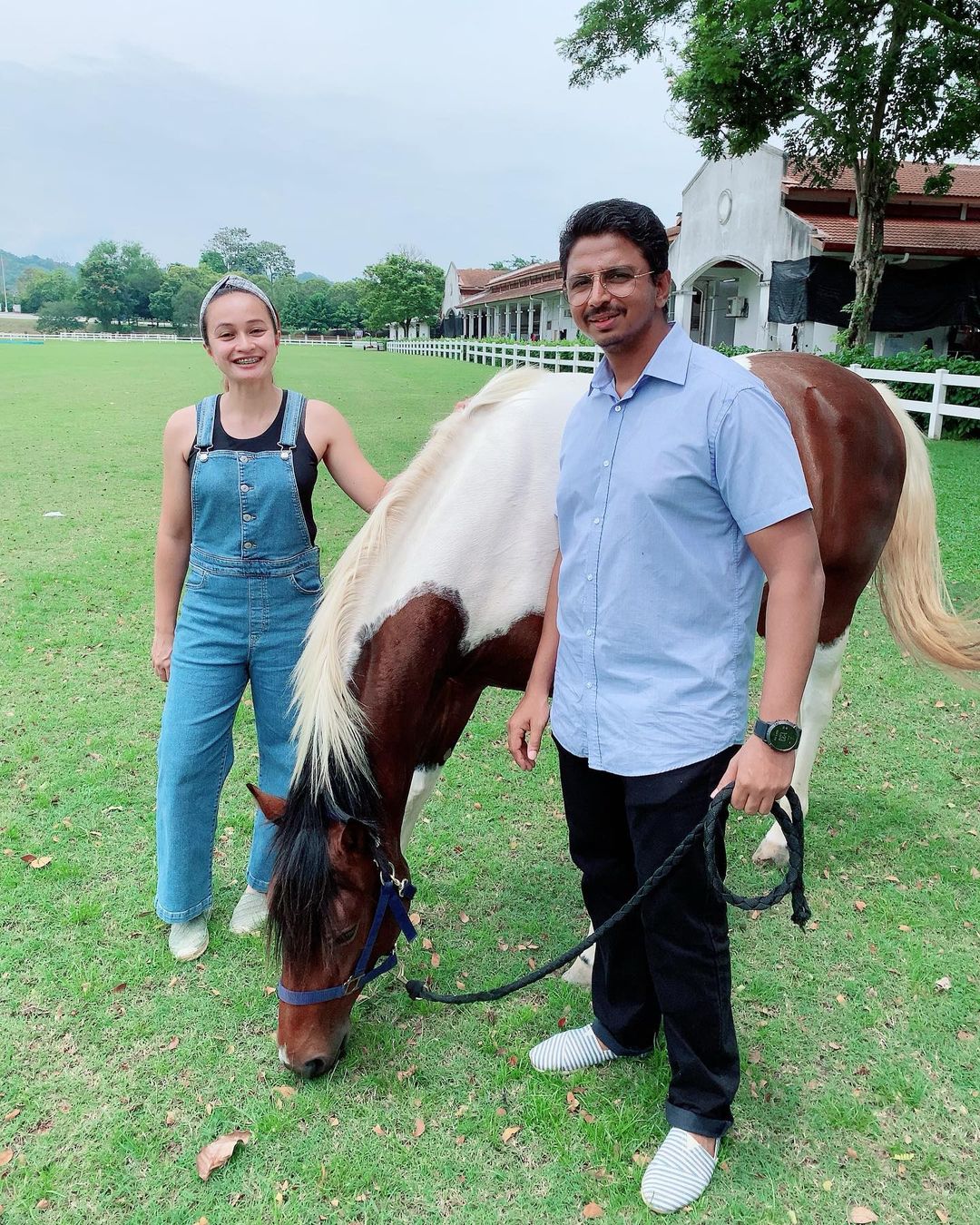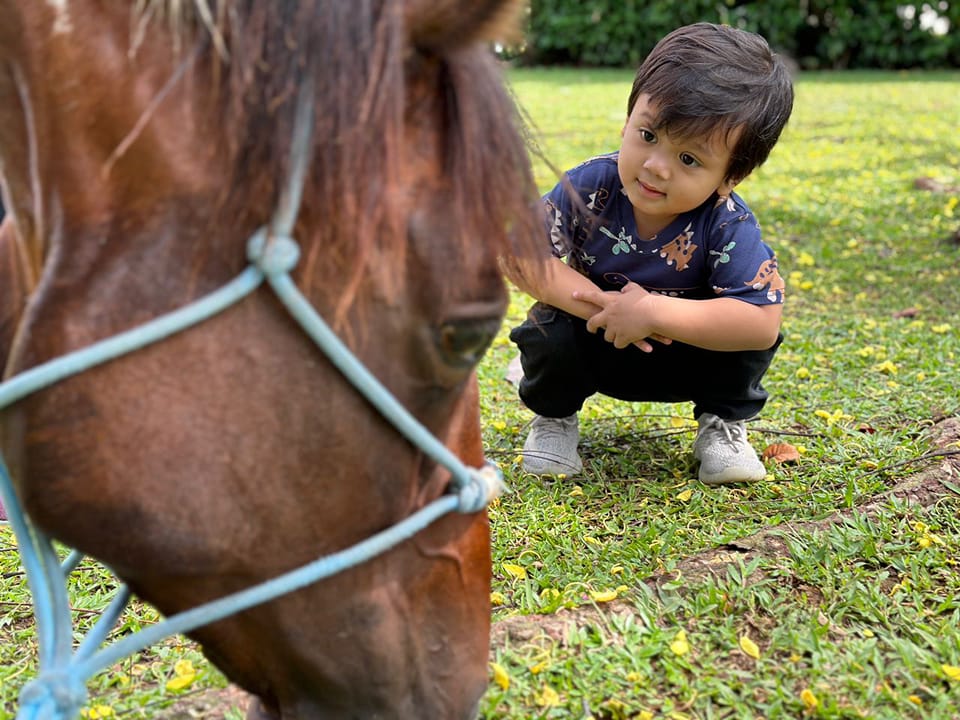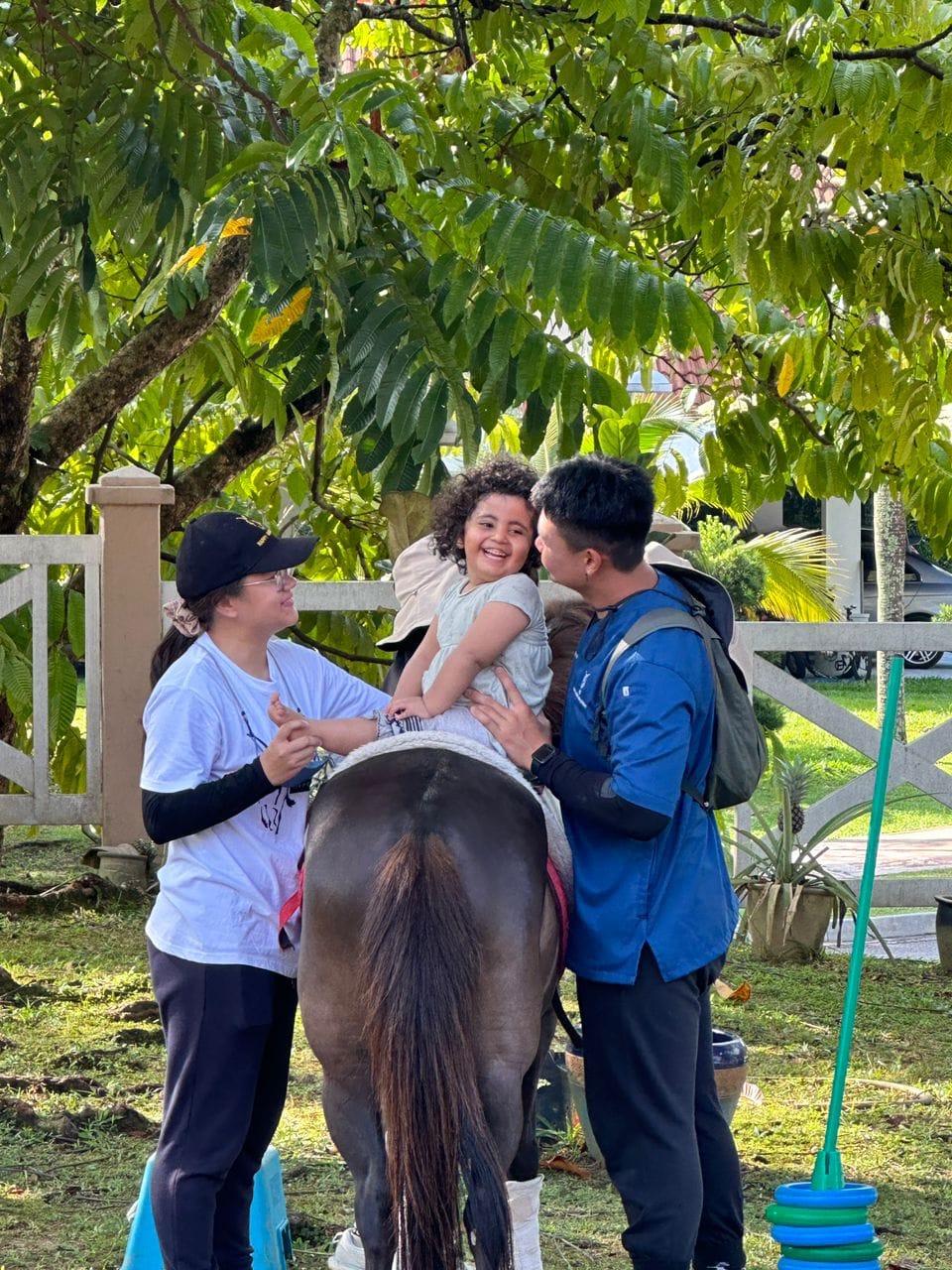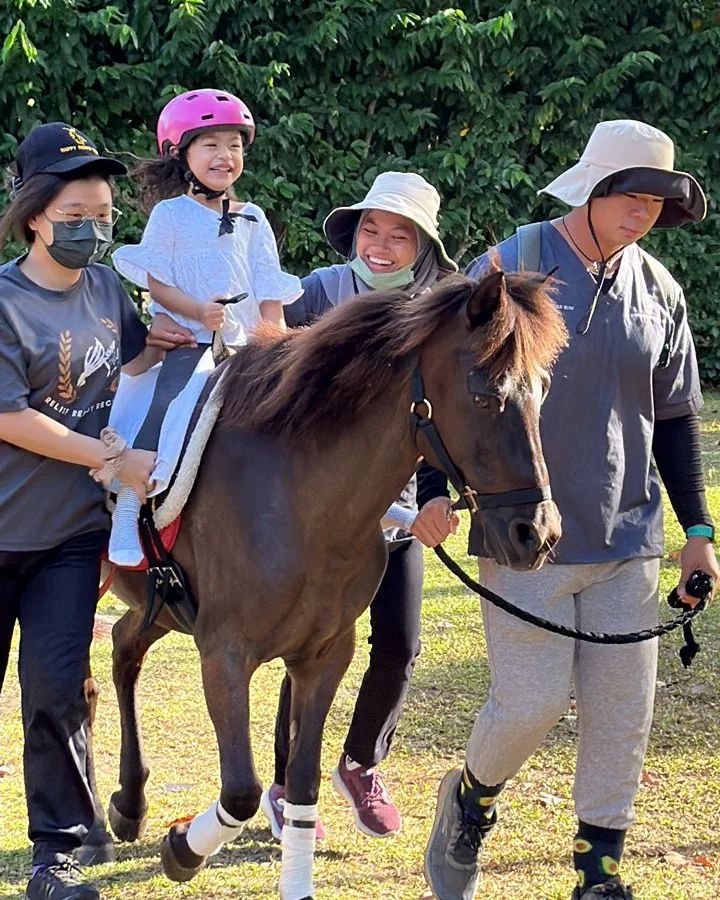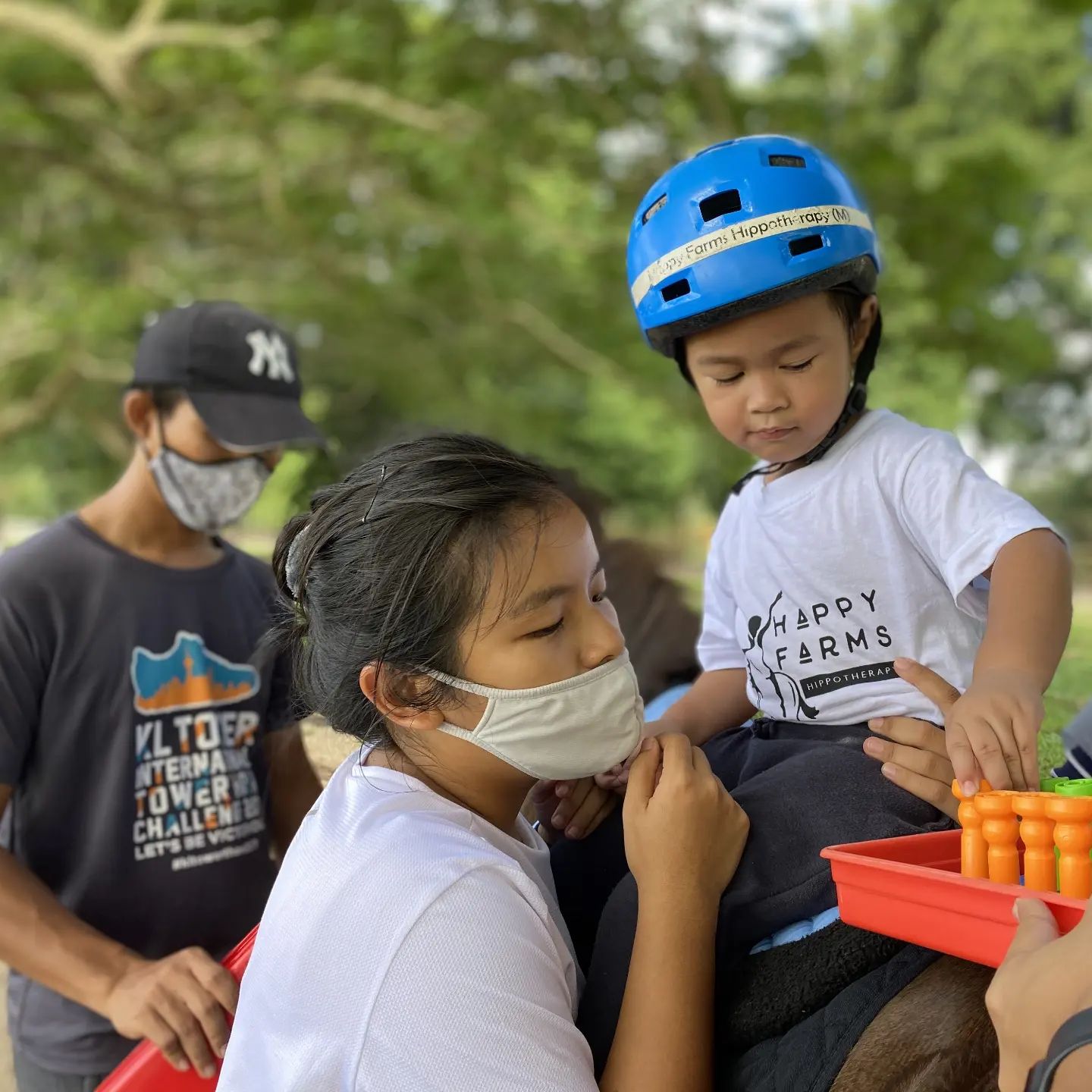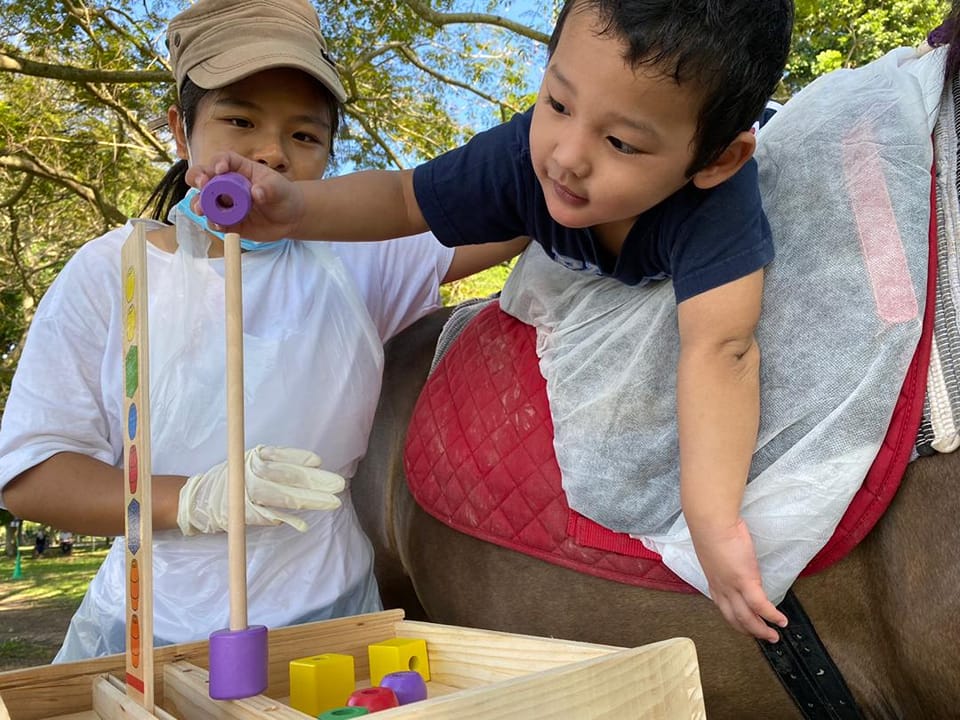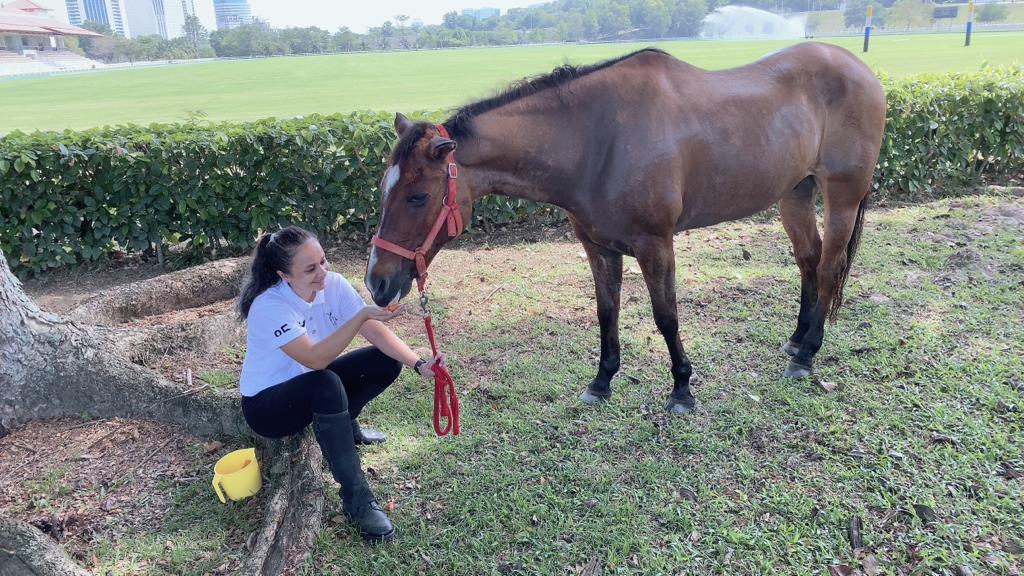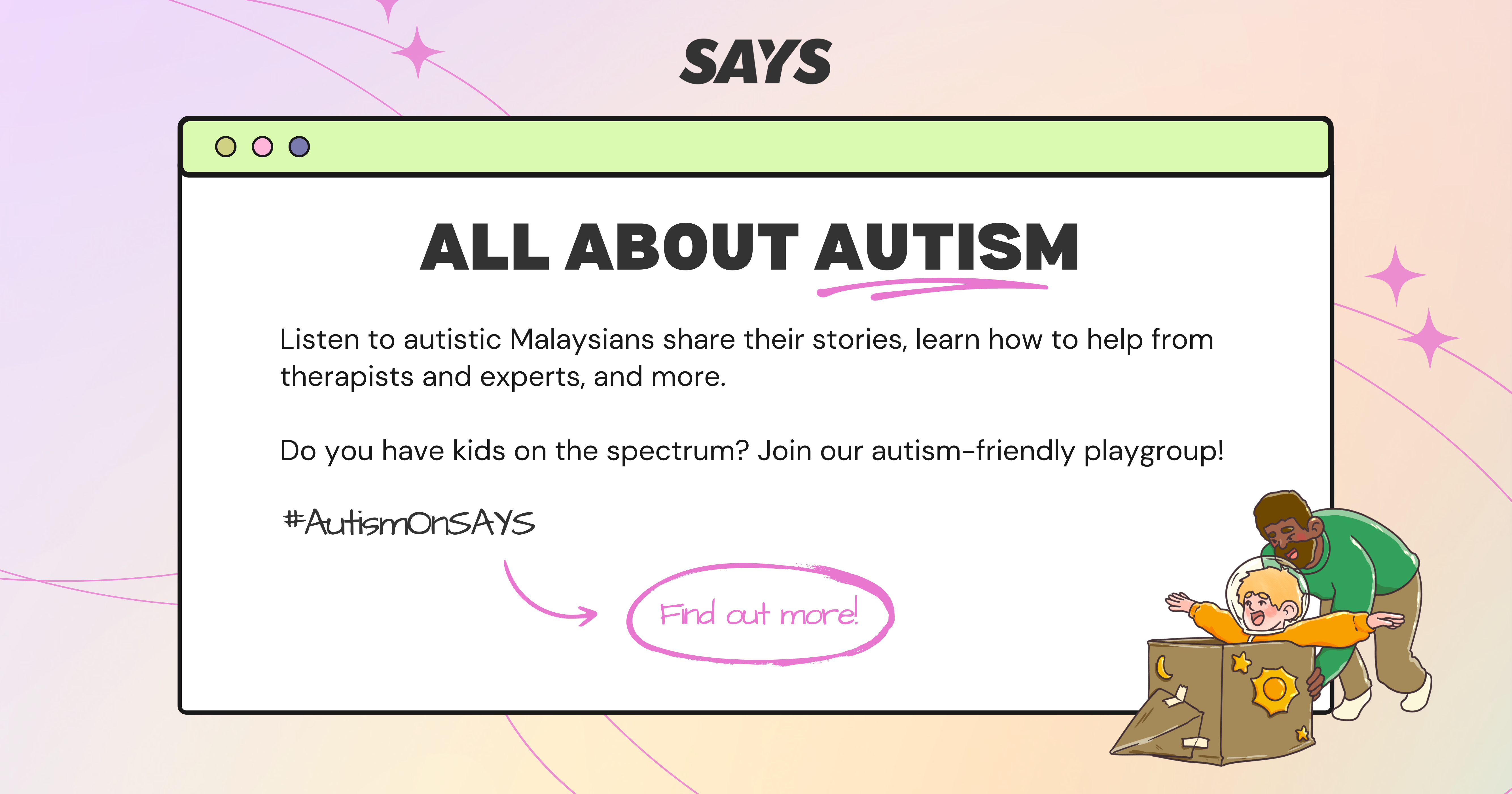What Is Hippotherapy? Here's How This Couple Uses Horses To Empower Kids With Disabilities
Hippotherapy is used by therapists to help people with autism, cerebral palsy, brain injury, and more.
Hippotherapy is a unique form of therapy that uses horses. It has gained recognition worldwide for its benefits in improving the lives of children with autism and other disabilities.
Nurirdiyana Idros, a senior paediatric occupational therapist who specialises in hippotherapy, is the leading advocate for this unique therapy in Malaysia.
Hailing from Penang, Nurirdiyana is dedicated to helping children with disabilities. The 38-year-old has a post graduate certification and is part of the Fellowship in Hippotherapy from South Africa, Greece, and Czech Republic, as well as the American Hippotherapy Association.
Nurirdiyana started practising hippotherapy in 2013, then, four years later, she formally founded Happy Farms Hippotherapy Malaysia with her husband, Kamadev Sonamuthu, affectionately known as Dr Dev.
We sat down with the couple to learn more about this unique form of therapy, their organisation, and the challenges they face.
Nurirdiyana and her husband, Dr Dev, are committed to helping children with disabilities through hippotherapy.
Image via Dr Dev (Provided to SAYS)What exactly is hippotherapy, and how does it help?
"Hippotherapy is a form of clinical rehabilitation (neuromuscular) therapy that uses equine movement (the movement of horses) as a therapy tool to engage sensory, neuromotor, and cognitive systems of the patient. Hippotherapy is used by occupational therapists, physical therapists, and speech-language pathologists to help patients with various disabilities, such as autism, cerebral palsy, brain injury, and more," explains Nurirdiyana.
"It helps children with autism and other disabilities by improving their posture, coordination, strength, communication, social skills, fine motor skills, and motivation. The horse's movement creates neurological changes that help the patient's body and brain to function better. The horse is also a powerful motivator and a source of emotional support for the patient," she adds.
Some children with autism and other disabilities have difficulties with sensory integration, which can affect their learning, development, and behaviour
Sensory integration is the process of receiving, processing, and responding to the environment around us, namely our five senses — sight, sound, smell, taste, and touch.
Hippotherapy helps sensory integration in several ways:
1. Improving sensory integration by providing tactile, proprioceptive, and vestibular stimulation through the horse's movement
Tactile stimulation refers to the sense of touch, proprioceptive stimulation refers to the sense of body position and movement, and vestibular stimulation refers to the sense of balance and motion. These types of stimulation help organise the senses and promote regulation, which leads to better attention, communication, social skills, and emotional control.
2. Providing a motivating, fun, and meaningful context for therapy
Children enjoy interacting with the horse and the therapist, and feel more comfortable and confident in their abilities. Hippotherapy also provides opportunities for sensory-based activities, such as grooming the horse, playing games, or completing obstacle courses, which further enhance sensory integration skills.
3. For children with cerebral palsy, it provides physical, cognitive, and emotional benefits
Children with cerebral palsy have disorders in pelvic movement, postural control, balance, coordination, muscle tone, and motor function. Hippotherapy helps improve these aspects by using the horse's movement to stimulate the child's neuromuscular system and facilitate motor learning.
Hippotherapy can also help children with cerebral palsy improve their communication, attention, memory, problem-solving, and social skills. Hippotherapy can also reduce the child's pain, spasticity, and anxiety.
The duration and frequency of hippotherapy depends on several factors, such as the child's condition, goals, response, and tolerance to therapy
Here's what parents can expect if they sign up their child:
- The child will be evaluated by a qualified therapist (a physiotherapist or occupational therapist) who has training and certification in hippotherapy. The evaluation will assess the child's physical, cognitive, and emotional needs, and determine the suitability and goals of hippotherapy for the child.
- The therapist will choose a suitable horse for the child, based on the horse's temperament, movement pattern, and shape. The horse will be controlled by an all-therapist team who will lead the horse and support the child on the horse.
- The child will be positioned on the horse in various ways, such as sitting forward, backwards, or sideways, lying down or kneeling, depending on the therapeutic objectives. The therapist will guide the child's posture and movement while on the horse, and use various techniques to facilitate the child's responses to the horse's movement.
- The child will also engage in sensory-based activities, such as grooming the horse, playing games, or completing obstacle courses, to enhance their sensory integration skills.
- The therapist will monitor the child's progress and adjust the therapy accordingly. The therapist will also communicate with the parents and other professionals involved in the child's care.
A typical hippotherapy session lasts 45 minutes.
The goal of Happy Farms Hippotherapy Malaysia is to provide children with disabilities access to effective therapy in an outdoor, nature-based environment.
However, the journey of building this centre has not been without its challenges.
Speaking to SAYS, Dr Dev explained that the first hurdle is that Malaysia is not an equine-based nation. As such, the cost and facilities needed to ensure the horses are properly cared for and managed is high. All the horses are purchased and owned by the couple, then trained from scratch to ensure the children's safety and comply to international standards, before being part of the therapy sessions.
Additionally, the nature of the intervention requires staff with strong knowledge and experience with both horses and children who have special needs.
Happy Farms Hippotherapy Malaysia currently has eight full-time therapists and six part-time therapists. All of them possess at least a Clinical Degree in Occupational Therapy or Physiotherapy, and are trained in horsemanship skills. Each team member goes through a structured and rigorous hippotherapy internship programme before they are allowed to be part of sessions with the children.
But the greatest challenge has been the stigma associated with disabled individuals
Since the inception of Happy Farms Hippotherapy Malaysia, Nurirdiyana and Dr Dev have struggled to find a permanent location to house their horses, that will also allow them to conduct hippotherapy sessions, due to the prevalent stigma attached to disabled children.
According to Dr Dev, many stables, usually run by private country clubs, are allegedly reluctant to rent out their space to the couple as existing clientele are uncomfortable with having children with disabilities in the same location, undergoing their therapy sessions.
In the 10 years that the organisation has been running, they've faced numerous challenges in securing a long-term stable and space for their horses and classes. Dr Dev alleges that their requests for a rented space have been ignored.
However, one significant partnership that has been instrumental in supporting the mission of Happy Farms Hippotherapy Malaysia is the collaboration with Perbadanan Putrajaya, the only entity willing to work with them so far. Perbadanan Putrajaya have provided their stables and land for the organisation to set up and run their programmes.
Happy Farms Hippotherapy Malaysia dreams to eventually acquire their own stables and land, however the high costs are currently not feasible for the non-profit organisation.
Despite the many challenges, Nurirdiyana and Dr Dev remain unwavering in their commitment to providing accessible hippotherapy to all children in need
The couple heavily subsidise the therapy fees in order to allow all children the opportunity to benefit from hippotherapy, regardless of their family's financial situation.
Each session lasts between 45 minutes to an hour, with two therapists and a trained horse, assisting the child.
As we celebrate the remarkable achievements of Nurirdiyana, Dr Dev, and the team at Happy Farms Hippotherapy Malaysia, it is crucial to recognise the challenges they face and the need for continued support
There are many ways that you can help support Happy Farms and their role in making the lives of disabled children and their families better.
1. Donate funds to help their operations and research, so they can continue to subsidise their fees and help more people
2. Volunteer at their centre and assist with the care of their horses and facilities
3. Follow them on Facebook and Instagram, and share their posts to raise awareness of their cause
By rallying together, we can ensure that more children with disabilities have access to the life-changing benefits of hippotherapy, and Happy Farms Hippotherapy Malaysia's vision becomes a reality.
